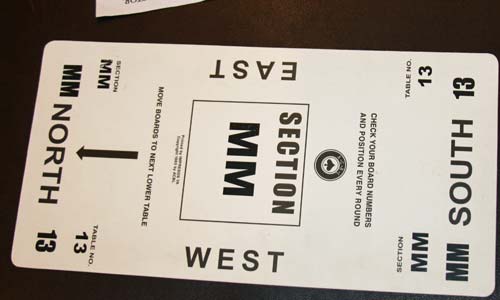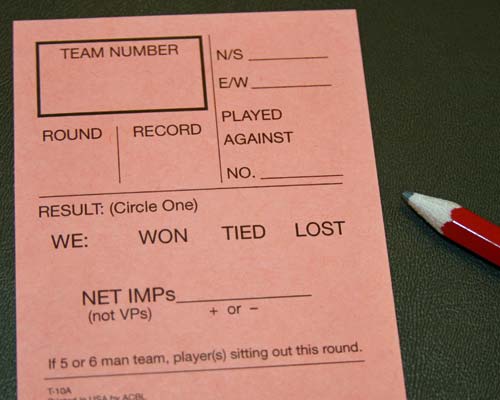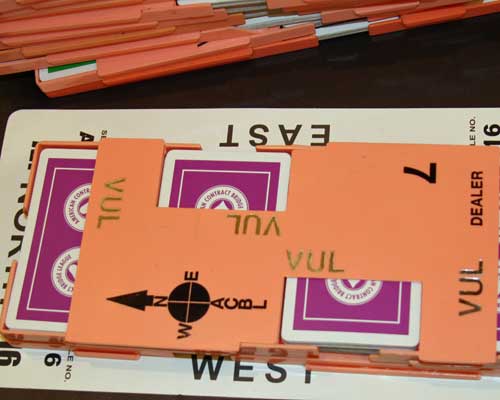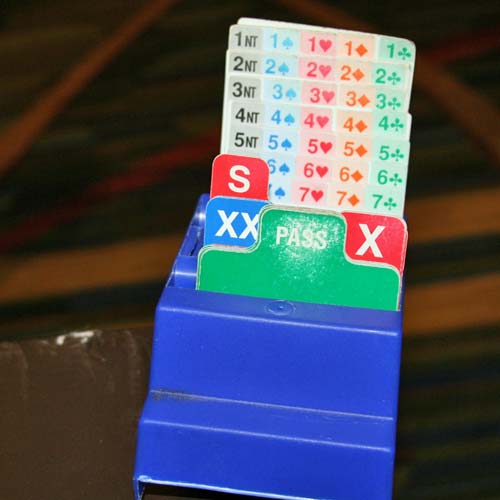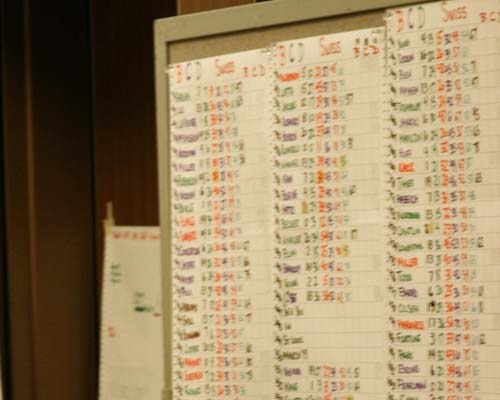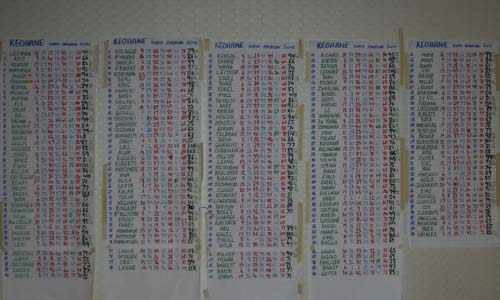Alert is an indication to your opponents that your partner’s bid has a meaning which might be unexpected. Alerts are common during bridge games and can be accomplished by showing the alert card from the bidding box, saying alert out loud or knocking on the table.
Announcement are explanations by the partner of a player when that player has made a call that is based on a partnership understanding in order to inform the opponents. Common announcements can be for things like the point count range for a 1 no trump opening bid, transfer for direct transfer bids and forcing or semi-forcing for a 1 no trump response bid to a major suit opening bid.
Auction follows the deal and lasts for the entire round of bidding on that hand.
Bid a number from 1 to 7 and a suit, spades, hearts, diamonds, clubs or notrump. An example of a bid is 4S or 2H.
Call is when a player bids, passes, doubles or redoubles during the auction.
Contract is the number of tricks in which the declaring partnership must take during the playing of the hand round in order to earn a plus score. The final contract is created when a bid is followed by three passes. For instance, if the final bid was 4H and three players pass afterwards, then the final contract is 4H and that partnership will have to take at least 10 tricks out of the 13 possible tricks during the play of the hand. The number of the bid is always added to the number 6 to determine the number of tricks that must be taken, in this case 4 + 6 = 10 total tricks.
Opening bid is when a player makes the first non-pass bid during the auction. The player who makes the opening bid is referred to as the opener.
Response is when the opener’s partner makes a bid in response to the opening bid made by his or her partner. The player who makes the response bid is known as the responder.
Overcall is when your opponent has opened the bidding and you have now chosen to make a bid. The overcall has meaning, as a suit overcall means a player has at least five cards in that suit and a no trump overcall means the player has a balanced hand with 16-18 points in it.
Rebid are all bids by any player that has already opened, responded or overcalled during the auction.
Double are opportunistic bids that are only permitted following an opponent’s bid. When a player doubles during an auction and three passes follow, the double is called a penalty double and increases the score of the final contract if made and increases the penalty the penalty if the final contract is not made. However, the main use of the double by partnerships is to describe your hand without using up bidding space in the auction. When a player chooses to double an opponents bid it means one of two things, the penalty double or the takeout double. The penalty double is normally made at a high bidding level when a player thinks his opponent can not make the contract that they just bid on. This penalty double penalizes opponents who overreach for a contract so it is used when a player anticipates the contract to go down. The other type of double is the takeout double which usually happens early in the auction. Normally made during your first bidding opportunity, the takeout double shows your partner you have strength and decent length in suits that have not been bid on yet. The meaning of the takeout double is to tell your partner to ‘take it out’ of the auction by bidding his longest suit. The takeout double is a powerful tool used by partnerships to take control of the bidding.
Redouble is something that occurs occasionally and is similar to a double. The redouble can only be used over an opponent’s double and if the redouble by a player is followed by three subsequent passes the scoring for the doubled contract increases and the penalty for not reaching the doubled contract increases. Often you will see a redouble when a team has made a bid late in the auction that they feel they will achieve, but their opponents have chosen to double the contract. If they still feel confident in making the contract, the bidding partnership may choose to redouble in order to significantly increase their score when they make the contract.
Cuebid is basically a fake bid which means strength in a suit which was bid on by your opponent. For instance, during the auction your left hand opponent bids 1 Spades and then you bid 2 Spades. Cuebid also has a second meaning when it used to signal an ace in a specific suit during a higher level bid.
Single Raise a bid in your partner’s suit at the level which is the lowest possible increase, for example if your partner bids 1 Heart and you follow with 2 Hearts. The single raise indicates a situation in which you have found a fit in trump with your partner. It also shows that you have a point count that makes this hand playable.
Simple Raise is another term used for single raise.
Jump sometimes you are holding a powerful hand for one reason or another and you choose to increase the bidding faster than the minimum by jumping up levels. For instance, your partner bids 1 Spades and you bid 3 No Trump. By making a jump in the auction levels you are indicating you hold a strong hand.
Jump raise is a jump in levels which also happens to be your partner’s suit that he just bid on. For example, if your partner bids 1 Diamonds and you hold a hand that fits the trump suit of your partner and has additional strength, then you can choose to make a jump raise with a bid of 3 Diamonds and 4 Diamonds.
Invitation are suggestions to your partner that asks him make a bid at game level if his hand has at least minimum strength to it. The invitation is a powerful move and is often used in different situations as a strategy to get the auction contract at the right spot for that team..
Jump-shift is an immediate indication of a very strong hand. The jump shift takes the bidding up a level and changes suits. For example if your opponent bids 1 Heart and you jump to 4 Clubs
Major Suit are the hearts and spade suits. The declarer will earn 30 points per trick taken in a contract that is not doubled when a major suit is the trump suit. For game contracts, a major suit must be bid to at least the 4 level.
Minor Suit are the clubs and diamonds suits. The declarer will earn 20 points per trick taken in an undoubled contract when a minor suit is the trump suit. For game contracts, a minor suit must be bid to at least the 5 level.
Bridge Game Play Glossary
Book is a common term in bridge which refers to the first six tricks that are taken by the declarer. Tricks above book are the ones which are counted towards making a contract, so a contract of 3 hearts means the declarer must make at least 9 tricks, 6 for the book and 3 for which he bid. From a defenders point of view, the term book can mean the number of tricks they need to take in order to defeat the contract. For example, if the contract is 3 hearts then the defenders can say book for defeating the contract is 4 tricks, if they can take a fifth trick then they will have defeated the contract and earned a plus score.
Claim is when the declarer states how the rest of the yet to be played tricks will be won or lost. After stating the claim, the player shows his hand and explains how the rest of the hand will play out. Though it is used when the rest of the hand will be obvious in order to save time. However, claims by the declarer can involve mistakes in how a hand will actually play out and it is often advisable to just play out the hand without claiming.
Cash is to win a trick with the highest remaining card of a suit. Cash also refers to the situation when a player takes all the possible winners in a suit.
Chicane is a bridge hand that does not have any trumps in it.
Chunky is a hand that has a bunch of honors in a suit that can do quite well without help from partner’s hand. A chunky suit is often said of four card suits with four honors in it.
Solid is a hand with a suit that is so strong it can go on a run where it takes tricks without any help from partner because it has many honors in it. During bidding, a solid hand does not require a fit with partner.
Run is to play the winners in a suit taking a series of tricks.
Declarer is the player from the partnership who first bid a suit or no trump in what turned out to be the suit of the final contract.
Dummy is the partner of the declarer. The dummy sits out during the play of the hand and his hand is laid out on the table – organized by suit and rank – after the contract is set and the opening lead has been made. The dummy does not play his cards during the hand play but instead the declarer chooses which card is played from the dummy’s hand during each round.
Defenders are the two players in the partnership which are against the side of the declarer.
LHO is an acronym for Left Hand Opponent.
RHO is an acronym for Right Hand Opponent.
Trick is the basis for this trick taking game, where a trick is the four cards – one from each player in turn – that is taken. Each deal has thirteen tricks. The trick is earned by the player who plays the highest card of the suit led or the highest trump played. The winner of the trick gets to lead the first card of the next trick. When all thirteen tricks have been taken, the tricks earned by each partnership are counted to determine if the contract was made and to figure out the scoring.
Lead is the first card played for each trick. After the lead, the other three players in a clockwise direction play a card of the same suit as the lead if they have a card in that suit.
Opening Lead is the lead for the very first trick of a dealt hand following the auction. The opening lead is always done by the player to the left of the declarer. After the opening lead is played, the dummy’s hand is openly placed on the table.
Master is the highest card of a suit that has not been played yet.
Trump Suit is the suit specified in the final contract that will be the most powerful suit during the play of the hand.
No Trumpis a situation in which the final contract is created without a trump suit. With no trump the highest card of whichever suit was led wins the trick during each round.
Trumping also known as Ruffing is when a player chooses to place a trump on a trick that is not the trump suit. A player can only play a trump card when the trump suit is led or if that player does not have any more cards in the suit that was led. A trump card wins over all other cards in any other suit and can only be beat by a player who plays a higher ranking trump card during that trick.
Discard is when a person plays a non-trump card since that player is unable to follow the suit led because they do not have any more cards of that suit.
Pitch is another word for discard.
Sluff is another word for discard.
Finesse is a maneuver in which you try to trap an opponent’s high card in a suit, therefore preventing losing a trick to that particular high card. Regularly you will see finesses used when a player has a hand in which most of the high honors he or she possesses but is missing the queen or king. These type of hands are known as tenaces.
Revoke is an illegal move that goes against the rules of bridge in which a player does not follow the suit led when that player actually holds one or more cards in that suit.
Renege is another word for revoke, the illegal move when a player does not follow the suit that is led despite having at least one card in that suit.
Glossary for Bridge Cards that are in Your Hand
Cold Contract is said when a partnership has a contract that they cannot go down even against the best possible defense.
Closed Hand is known as the declarer’s hand which is opposite of an open, or faced hand that is the dummy’s hand.
Honors are the most important cards in bridge games as their ranks make them the ones most likely to win tricks. The ace, king, queen and jack are known as honors. Additionally, the ten is in some circumstances also considered an honor.
High-card points are a way to value your hand by counting the honors using a point count system. The ace, king, queen and jack are worth 4, 3, 2, and 1 respectively as high card points. The total of points of your hand’s high cards is the total high card points for that hand.
Quick tricks are the honors in your hand that likely win tricks in that suit when that suit is played. The cards associated with quick tricks are aces, kings and certain combinations of high cards. When you hold an ace, king, ace-king, ace-queen or king-queen you have quick tricks.The ace-king combination holding equals 2 quick tricks, an ace-queen combination holding equals 1.5 quick tricks, an ace or king-queen combination holding equals 1 quick trick, and a king holding equals .5 quick trick. Most opening bids have about 2.5 or more quick tricks.
Slow tricks are the honors in your hand that likely will win tricks later in the hand. The slow tricks in your hand are queens, jacks and queen-jack combinations.
Playing tricks is a count of the number of tricks in which your hand will be able to take based on its strength. This trick estimating method assumes a fair split of the missing cards when you win the contract. To calculate playing tricks in bridge you take the number of tricks you will win with your long suits and add that amount to the number of quick tricks you have in the other suits.
Tempo is referred to as the speed in which a player makes a call or play. A break in tempo is often a sign that a player has to think about a specific situation, such as when playing his or her card she has an unexpected problem. Experienced players can intimidate their less experienced opponents by keeping a fast tempo.
Tank is slang for huddle, which is a pause during play when a player needs extra time to think of his bidding or card play decision.
Losing-Trick Count is a system of determining your hand strength that focuses on the number of cards that will not take tricks if you win the contract. You would count 1 loser for every missing ace, king and queen in each 3 or more card suit, count 1 loser for each ace or king that you are missing in a two card suit, and count 1 loser for a missing ace in a one card suit.
Stoppers are cards in your hand that can prevent (stop) your opponent from easily going through their suit when you bid a no trump contract. For example, if you have a king in diamonds and your opponents have the ace, queen and jack of diamonds your king acts as a stopper. Similarly, if you have a queen or jack in a suit that your opponents hold the honors in then they are stoppers.
Controls are cards in your hand that will invariably earn the first or second trick when that suit is led. Controls can be split into two types, first round controls and second round controls. First round controls are aces or for trump contracts having a void that allows you to immediately play a trump. Second round controls are kings or a singleton in the suit.
Void is when you have no cards of a suit in your hand.
Singleton is when you have a one card suit in your hand.
Doubleton is when you have a two-card suit in your hand.
Balanced hand is when you have all the suits represented in your hand so that you do not have any voids or singletons and generally speaking only one doubleton at the most. When you have a balanced hand your cards are distributed by suits either 4-3-3-3 , 4-4-3-2 or 5-3-3-2. In some circumstances a 5-4-2-2 distribution can be considered balanced. Often on the initial bidding round, natural no trump bids are normally a sign the player has a balanced hand.
Unbalanced hand is a hand that is not balanced because it has more cards of one or two suits than the other suits. Unbalanced distribution of cards can mean that the hand has only two cards of one suit, one card of one suit, or no cards of a suit. Distributional hands will often have long suits with 6 or more cards of a single suit. Unbalanced hands play a large role in the strength of the hand with many ways to count how the uneven distribution relates to the overall strength of the hand. Distributional points are one of the more common ways to factor in hand value with an unbalanced hand.
Misfit are the two partnership hands when neither hand offers assistance to the other hand’s long suit. For example, if one hand has strength in both red suits but the partner’s hand only has strength in the black suits the two hands do not fit together.
Distribution points is a system of determining the strength of a hand that improves upon simply counting your high card points. The distribution points are points that are added to your high card points that come from factoring in the distribution of the cards you have in your hand. A short suits get points: doubleton = +1, singleton = +2, and void = +3. When looking at your hand, first count the number of high card points and then add to that total your distribution points to determine your total point count. Note: distribution points should be taken into account mainly after your partnership has found a trump fit between the two hands. Because you do not know any information about your partner’s hand and therefore you do not know if you have a trump fit, the distribution points should not be used to make an opening bid.
Tenace is a technical term for honor combinations that are not sequential. Examples of a tenace are Ace-Queen, Ace-Jack and King-Jack, though there are several more. These tenaces present opportunities for a partnership to catch the missing honor (with Ace-Queen tenace, the missing honor is the king) by playing a finesse.
Winner is a card that can take a trick on the hand that is being played. Many players will count the number of winners they have in their hand.
Loser is the opposite of a winner. Losers in your hand are the cards that appear not to be able to take a trick during a given deal. Losing trick count is a method to evaluate your hand by counting the number of losers in your hand.
Yarborough a term coined from an English Earl of Yarborough that refers to a hand with no honors in it meaning it does not have any card higher than a nine. The odds of being dealt this weak of a hand is 1,827 to 1 though in common usage the bridge glossary term could refer to any extremely weak hand.
Scoring Glossary for Bridge Card Games
Trick score are the points given if the contract is made for every trick over six – six is book. The trick scoring depends on the contract suit as minor suits, clubs and diamonds, are given 20 points for every trick and major suits, hearts and spades, are given 30 points for every trick. When the contract is set in no trump, the first trick over book counts for 40 points and each additional trick is worth 30 points.
Game is usually what partnerships aim to set contracts at since bidding game means that partnership will earn at least 100 trick points if they fulfill the contract and they earn the game bonus. Bidding for game is accomplished by setting the contract at 5 in minor suits, 4 in major suits and 3 in no trump. You can figure this out because in clubs or diamonds it would take 5 tricks above book at 20 points apiece to earn 100 trick points. It would take 4 tricks above book in hearts or spades at 30 points a piece to earn 120 points. It would take 3 tricks above book in no trump with the first trick earning 40 points and the other two tricks earning 30 points to earn 100 points.
Slam is a contract at the six or seven level in which if the contract is made the partnership will earn significant scoring bonus points.
Small Slam are contracts at the six level in any suit or no trump. A scoring bonus will be given to made contracts at this level.
Grand Slam are contracts at the seven level in any suit or no trump. An even larger scoring bonus than the small slam bonus will be given to made contracts at this level.
Part Score are points given to made contracts that are below the level of game. Since the game bonus is 100 points, two or more part scores in a single hand can be added together with the trick scores for that hand in order to earn the game bonus.
Penalty are the points earned by the defenders when the declarer is unable to fulfill his contract. The goal of the defenders is to always make the contract go down by playing their cards in the best possible way.
Pass-out is a situation in which all four players first bid is a pass. When all four players choose to pass no score is given and a new hand is dealt unless playing duplicate bridge in which a score of zero is given to both sides and the hand is not re-dealt.
Score Slip A paper form used in duplicate bridge to transfer the recorded result by a pick-up slip.
Score Report Shows the result of the match.
Honors is a rubber bridge scoring bonus of 100 or 150 points given if a player has four or five of the honors in the trump suit or a player has all the aces in a contract that is no trump.
Rubber means two games, and a partnership who earns the rubber gets bonus points. The rubber goes to the first partnership who earns the game bonus twice.
Vulnerable (rubber) is a situation in rubber bridge in which a partnership has one game towards the rubber bonus.
Not Vulnerable (rubber) is a situation in rubber bridge in which a partnership has no games towards the rubber bonus.
Vulnerable (duplicate) is a situation in duplicate bridge when you get increased bonuses by making a contract and increased penalties when you go down by not making the contract.
Not Vulnerable (duplicate) is a situation in duplicate bridge when a partnership is not vulnerable for the current hand. In bridge, the first hand no one is vulnerable. On the second deal, East-West are vulnerable. On the third deal, North-South is vulnerable. On the last deal, everyone is vulnerable. When playing duplicate bridge, the bidding boards are marked clearly showing who is vulnerable during the current deal.
Penalty Card is a card that is intentionally or unintentionally exposed out of turn by the defense. The play of the card depends on the card rank, whether it was an intentionally shown or not, and other rules. There are major penalty cards and minor penalty cards. All honors are considered major penalty cards regardless if it was exposed by accident or on purpose. Major penalty cards are left face up and must be played at the first legal chance even if it is simply to discard. A minor penalty card, which is given to a non-honor card that is exposed early by accident, also remains face-up on the table until it can be played, but a player may play a honor card of the same suit before playing the minor penalty card.
Duplicate Contract Bridge Glossary
ACBL is the acronym for the American Contract Bridge League. The ACBL is the United States organization in charge of sponsoring and sanctioning duplicate bridge games at local clubs and the tournaments played throughout the year in different locations. Based on results, the ACBL gives players masterpoints. The ACBL records the masterpoints for each member and you can find out how many masterpoints you have through their website.
Masterpoints are points given to members of the ACBL for doing well in a duplicate bridge event. The better you finish in an event the more masterpoints you will earn.
Board is how you reference an entire deal, as in what was the score on that board. In duplicate bridge the term board can refer to the tray made of plastic or metal that holds the pre-dealt cards at each table.
Bidding Box is the small box on the table that contains cards that represent each of the 35 possible bids, Pass, Double and Redouble. These cards are used for the purpose of silent bidding in an effort to keep the bidding process fair. Bidding boxes are commonly used at clubs and tournaments.
Matchpoints is a scoring system used in pairs games. With matchpoints, for every board played the partnership score is compared to the scores of other partnerships who played the same cards as your partnership. For each board, every partnership your partnership outscores, your partnership earns one point. For each tie, your partnership earns a half of a point. The partnership with the most masterpoints for all the boards of a session wins the game.
Top is the most matchpoints possible your partnership can receive on a board.
Bottom is zero matchpoints, the opposite of top since it is the least amount of points a partnership can earn on a board.
Board-a-Match is another name for Point-a-Board which is a form of scoring for teams. Similar to matchpoint scoring for pairs. Less commonly used than IMP scoring, in a board-a-match scoring a team earns one point if the pair earns more points than the opposing pair playing the same cards at the other table, half of a point if they tie, and zero points if they have a lower score.
IMPs are International Match Points which are a method of scoring team games. For each board the difference between your partnership score and your opponents score is changed to IMPs. The team with the most IMPs wins the match. IMPs can be positive or negative.
Swiss Teams is an event created for four player teams. A team plays against other teams with scoring done by IMPs with Masterpoints at stake.
Knockout Teams is a team event that lasts for many sessions. A team continues to play a session against another team as long as the team continues to win, if a team loses they are eliminated. The Knockout Teams winner is the team that remains after all other teams have been eliminated.
Bermuda Bowl is the most coveted prize in contract bridge tournaments. The Bermuda Bowl cup is awarded to the international team championship winner of the Bermuda Bowl.
Screens When playing live bridge a wall between players that prevents partners from seeing one another.
Bridge Glossary – A Dictionary of Bridge Terms
There are many words in the contract bridge glossary that describe a number of situations, bids, scoring and game play which are important to learn in order to play bridge games well. The bridge dictionary definitions above is a list of the main phrases and terms used to play bridge, but the bridge glossary is an incomplete list as there are many more words commonly used in bridge games.

